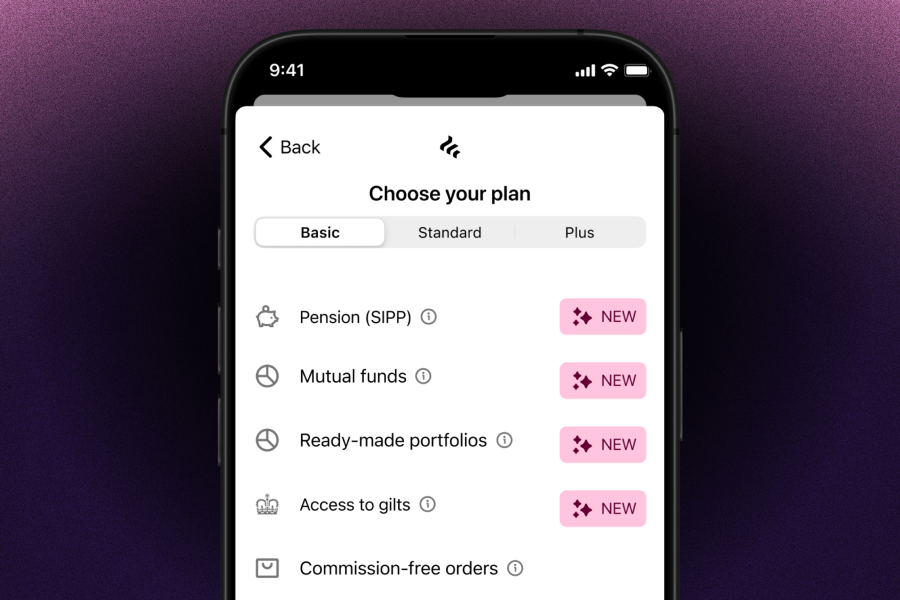The gender investment gap is no secret, it’s a very costly fact.
In the UK, women hold £15bn less in investments than men [1]. And not only do they invest less, they’re also less likely to invest in the first place. Around 28% of women in the UK are investing, compared to nearly 46% of men [2].
Instead, women are holding their cash as savings. That can be useful for financial goals with a short time horizon, like in the next few years. But when you’ve got bigger goals for further down the line, like buying a house in five years, investing can help. That’s how investing differs from keeping your savings as cash. When you invest, you’re giving yourself the opportunity to grow your money.
The good news is that investing is a lot simpler than it’s often shown to be. And the most important factor in all of this is getting started. Time is the most important ingredient in investing, the longer you can leave your investments to grow, the better.
Getting started
With getting started in mind, we asked what got women at Freetrade investing in the first place. How and why did they take that first step?
We hope these insights make investing feel a lot more doable for those who haven’t yet started. And if you have started, you’ll find some investing and pension-related tips in here too.
"I wanted to grow my savings"

I started thinking about my financial future when I got my first job out of university. I was saving money with the hopes of buying a home and car, all while making sure I had an emergency fund in place.
I began with a cash savings account but learned pretty quickly that the only way my money would grow was if I put more money in. So my cash wasn’t doing any work for me in the background. It was just sitting there really.
That’s why I decided to start investing. My goal was to protect my savings against inflation (a risk that I don’t think people talk enough about) and give myself the opportunity to grow my savings.
💡 Why invest?
I started out with several index funds. Investing ethically is important to me, so I decided to choose funds with holdings in sustainable businesses. At the end of every month, I set aside a portion of my salary to make sure I stay consistent with my investing.
I now see that money similarly to how I see rent or bills. That’s because my monthly investment is a priority, which means I’m a lot less tempted to take the cash and splurge (do I really need those new headphones?).
I’ve been consistently investing and growing that pot for a while now. And I’m really enjoying watching my investments grow.
My tips are to not just blindly invest in stocks your friends recommend or some Reddit chat’s raving about. You have to do your own research - that was what led me to choose index funds over individual stocks. Knowing I’m investing in companies that I decided to invest in on my own, as opposed to just following someone else’s lead, helps me keep a level head when my investments drop in value. I know what I’ve invested in and why. And I know that investing is for the long term, so there’s likely to be some ups and downs along the way.
"I was looking for my old pensions"

One of the best things I did last year was to look into my pension. In all honesty, I was scared to deal with it. I thought everything would be complicated and that I still had plenty of time.
All it took was some playing around with pension calculators to get worried. The website was telling me I should have saved or invested double my annual salary (which wasn’t actually the case). Alarm bells went off.
I knew I had to start somewhere, even if starting meant small.
So I immediately opened a SIPP and started the journey of transferring my pensions over.
There’s no point in sugar-coating it, this wasn’t an easy process.
I’ve lived in the UK for 12 years now and had multiple jobs. It was hard even to remember some of those employers let alone the details of my pension plans. So it took a while to dig through emails and paperwork to find the information I needed.
I had four pensions to transfer. The Freetrade transfer team was great in helping out once I retrieved the essential details.
It took a couple of months to complete all the transfers because my case was a bit more complex than usual. But it was all worth it. I now have a clear understanding of how much I have in my SIPP. I can make monthly contributions, and I’m entirely in charge of managing the pension pot straight from the app.
Being able to manage my own investments is super important to me. It’s what made the whole process so worthwhile. It’ll be daunting at the start but it’ll be an even bigger relief once you’re done transferring.
One of my biggest tips is to make sure all your providers have the most up to date information, address etc. If you move houses, remember to update your address with your old or existing pension providers. What delayed my transfers was contacting each old pension provider to update my address. And every time you start a new job, remember to save any emails and documents related to your new pension.
💡 How to find old pensions
It’s also okay if you can’t remember what pension (or pensions) you have. Don’t stress! You can use a pension tracing service to identify them. They are not lost!
I also recommend making small contributions monthly. That’s when you get to see the power of your investments building up (and compounding) over the long term.
"I didn’t think I had the time, then I stuck to the basics"

I was really lucky to get the opportunity to work for a company where my colleagues were experienced investors. They held “lunch and learn” sessions which piqued my interest and got me thinking about whether I was ready to start my own investment journey too.
These discussions also allowed me to get more familiar with the wider investing landscape. Learning from others who were already comfortable investing gave me more confidence to do it myself.
I learnt investing was a good way to maximise your savings and give you the best chance to grow them over the long run. Investment decisions should be careful, not just a shot in the dark.
I find I lack time to be able to research different companies so I prefer to invest in ETFs (or exchange-traded funds) which allow me to invest in lots of companies in one go. Usually, I go for one that follows all the companies in an industry (sector ETFs) or one that covers the entire stock market somewhere like the S&P 500 in the US.
I’ve found this method avoids the stress of stock picking. I don’t have to choose each stock individually because the index is tracking multiple stocks for me. This is also a helpful way for me to boost my portfolio’s diversification without having to research than buy all the different companies myself.
I’d suggest finding resources that you can trust and explain things clearly. It’s key they help you understand and build your rationale for the investment decision you’re making and why.
Start with the basics and then build-up, there’s no rush or race.
"I started with £100, now I’m in it for the long haul"

My first investment was in a fund, which basically packages lots of different stocks into one. I’d heard from a friend it was an easier way to get comfortable investing. I was ready to dip my toe into the market, and I knew it was best to start early, so I started adding £100 to my brokerage account every month.
My main goal was to grow my investments to a level where I could live more comfortably.
This period was the first step for me to start investing, and it gave me the confidence to keep going. At first, to be honest I just wanted to make money quickly. But investing during Covid meant the value of my investments fluctuated, and my mentality changed. Now, I’m happy to part with my money knowing that in a much longer period, say 7 years or so, I’ll have something (hopefully) bigger to look at.
My top tips come down to knowing what you’re investing in and why. While I started with funds (where someone else was in charge of picking the companies) I’ve started to choose a few companies to invest in myself.
💡 How to invest in stocks
When I’m deciding where to invest, I usually focus on companies with a proven track record. Companies with solid fundamentals and a history of providing good returns. I know past performance isn’t everything, but it can at the very least be a good place to start.
It’s important to look at the company’s performance during good times and bad, by taking a look at how a company fared in a previous crisis, you’ll get a good indication of how resilient it is.
[1] Kantar, Winning with Women: encouraging women to invest, 2021. https://www.kantar.com/uki/inspiration/finance/winning-with-women-encouraging-women-to-invest
[2] Finder, Female investors in the UK, 2022. https://www.finder.com/uk/women-in-investing
Important information on SIPPs
SIPPs are a pension product designed for people who want to make their own investment decisions. You can normally only access the money from age 55 (set to rise to 57 from 6 April 2028).
This article is based on current rules, which can change, and tax relief depends on your personal circumstances. When you invest, your capital is at risk.
The value of your portfolio can go down as well as up and you may get back less than you invest.
Before transferring a pension you should ensure you will not lose valuable guarantees or incur excessive transfer penalties. Pensions are usually transferred as cash so you will be out of the market for a period.
Freetrade does not currently offer drawdown products for our SIPP.
This should not be read as personal investment advice and individual investors should make their own decisions or seek independent advice. This article has not been prepared in accordance with legal requirements designed to promote the independence of investment research and is considered a marketing communication.When you invest, your capital is at risk. The value of your portfolio can go down as well as up and you may get back less than you invest. Past performance is not a reliable indicator of future results.Freetrade is a trading name of Freetrade Limited, which is a member firm of the London Stock Exchange and is authorised and regulated by the Financial Conduct Authority. Registered in England and Wales (no. 09797821).












